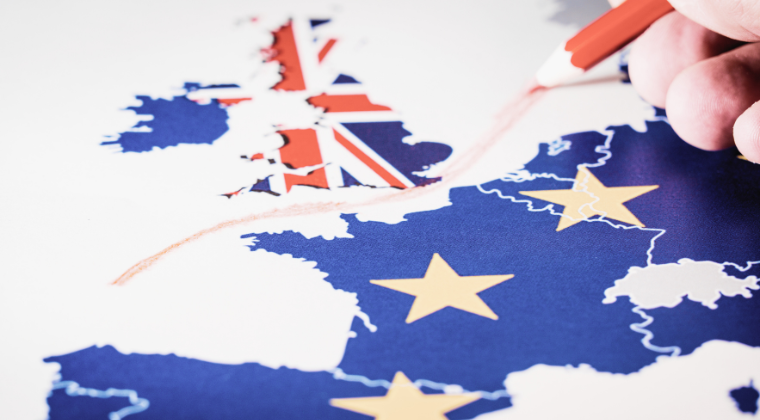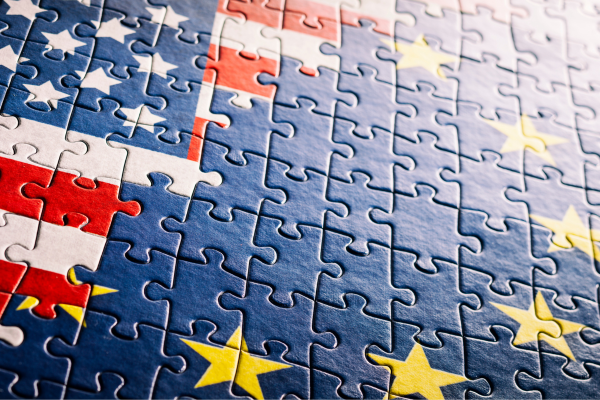BY:
SHARE:

The EU implements the General Product Regulation 2023 on the 13th of December 2024. Impacting on all EU imports, including UK exports to the EU for those goods captured by the regulation.
This regulation replaces the EU Directive 2001/95/EC, which originally aimed to develop European standards for product safety. The 2001 Directive placed an obligation on each member state to implement standards, but as a directive, it did not hold the same level of legality as a regulation. The 2001 Directive has been determined as out of date as marketplaces have changed dramatically since it was introduced. E-commerce and online shopping platforms are now commonplace, whereas, in 2001, no one had heard of Amazon as a shopping platform, for example. The necessity and ability to regulate goods standards have steadily changed in recent times.
The GSPR also replaces the Food Imitating Product Directive, although it does not cover food itself, which falls under other strict regulatory controls. It is also closely linked to regulations such as the Digital Services Act and the Market Surveillance Regulation.
What is the aim of the EU regulation?
The regulation is intended to provide a high level of consumer protection with a clear line of responsibility for those responsible for manufacturing and importing the products, and those involved in the supply chain processes relating to the products to be placed on the EU market.
Determining responsibilities and roles within the import process is intended to underpin product standards and support reporting requirements should products fall below the required standards. This, in turn, is intended to support the consumer should substandard goods require recall, replacement, or refund.
The regulatory term ‘Economic Operator’ is intended to ensure that there is one point of contact within the EU relating to products put onto the EU market. The Economic Operator may be a manufacturer, the authorised representative, the importer, the distributor, or the fulfilment service provider, for example, based within the EU. For a third country such as the UK, determining the Economic Operator as the point of contact within the EU will be the salient issue in enabling import into the EU. Without an appointed ‘Economic Operator’ to take responsibility as the point of contact for product safety, an import could falter at the border.
The regulation also covers second-hand, reconditioned, and repaired goods. This requirement in particular is intended to future-proof the regulation.
Key Points of the GSPR
The regulation will apply to new, used, repaired, or reconditioned products that are placed or made available on the EU market, whether those products are sold or free issued (consider warranty replacement as an example). Exempt goods are those that are covered by other EU product safety regulations. The new regulation has the specific intent to capture aspects of safety regulation that are not covered elsewhere in EU legislation for product safety.
The application of the regulation covers products offered in the EU through all sales channels and platforms.
The GSPR does not apply to products that are already well-provisioned in EU Product Safety regulations. These goods are:
- medicinal products for human or veterinary use
- food and feed
- living plants and animals, genetically modified organisms, and microorganisms in contained use
- animal-derived and by-products
- plant protection products
- transport equipment operated by a service provider
- aircraft whose design, production, maintenance, and operation pose a low safety risk
- antiques
- products clearly marked to be repaired or reconditioned prior to use
How will it work
Implementation will involve the delegation of responsibilities into specific roles for those involved in the manufacture, distribution, and cross-border movement of products. The introduction of the Economic Operator as a term is intended to ensure that there are no gaps in the lines of responsibility for the product safety of goods placed on the EU marketplace.
A Safety Gate portal has been initialised for reporting non-compliant products. This portal will enable smooth communication between the regulatory bodies for each member state, simplifying product recalls. It will also allow the public to report incidents and complaints relating to products.
A safety business gateway has also been implemented to enable reporting of dangerous products to authorities in member states.
There is also scope within the regulation's working practice to become responsible for reporting product non-compliance relating to other role holders or to risk taking on the responsibility of the specific non-compliances yourself.
This regulation delegates obligations for the relevant economic operators and providers of online marketplaces. It also clarifies market surveillance rules and implements the powers of the national authorities, which have a major role in regulating working practices.
Economic Operators Obligations:
The definition of Economic Operator can be found in Chapter III, Section 1 of the regulation. A link to the regulation is below.
The legal definition of the term can be found in Article 3 as follows:
‘Economic operator’ means the manufacturer, the authorised representative, the importer, the distributor, the fulfilment service provider, or any other natural or legal person who is subject to obligations in relation to the manufacture of products or making them available on the market in accordance with the regulation.
The role of the Economic Operator is pivotal. A new term without definition elsewhere in EU regulations, the role is set out with the obligations to:
- establish internal product safety processes to comply with the regulation
- cooperate with market surveillance authorities to eliminate or mitigate risks from any products that they are responsible for having placed on the market
- Provide specific product information (complaints, risks, and corrective measures) if requested by the authorities.
- Records on product data must be kept for 10 years, and supply chain traceability information for 6 years
- inform authorities about accidents caused by a product
- provide data to a traceability system the European Commission may establish at some future point intended to store details of products likely to present a serious risk to public health and safety
- directly inform all affected consumers about product safety recalls and safety warnings, in the case of product recalls, using a mandatory recall notice template
- offer consumers the choice of at least two of the following remedies when a product is recalled:
Either repair or replacement of the product or an adequate refund;
- follow specific rules for distance sales by giving details, as part of the pre-contractual product offer, of the manufacturer or their representative, a clear description of the product and any warning or safety information.
There is a legal responsibility to report a product where there are consistent product safety issues. The reporting party is non-compliant if a reporting party determines product safety issues with goods and finds that the product has not been reported.
Exporting from the UK to the EU: Requirement to have an Economic Operator in the EU
For each product covered by the regulation for import into the EU, there must be a point of contact in the EU responsible for tasks relating to the product's safety. Traceability and accountability are legal responsibilities within this regulation.
The Economic Operator could be an importer, an authorised representative or a fulfilment service provider contractually obligated for product responsibility within the EU. The EO could also be an EU manufacturer taking on the role of EO for a UK sister company,
Products captured in the regulation cannot be imported without the Economic Operator having been provisioned in the first instance.
Therefore, a UK business intending to export for import into the EU would need to make sure that regulatory obligations for import into the EU are met. The intent is that goods are not held on import due to the lack of a responsible person having been appointed as EO within the EU.
The Main Obligations of Manufacturers:
The main obligations for Manufacturers are as follows:
- ensure products are safe by design. UK manufacturers will already be manufacturing to given regulatory standards. CE marking is encompassed within this regulation but is not the only provision required. Goods not subject to CE marking may fall within the regulation if not provisioned as an exempted product.
- Carry out internal risk analyses and draw up relevant technical documentation that details the business's compliance with EU regulations. This will include consideration of how the product may interact with other products.
The documentation is subject to audit further down the supply chain.
- Act immediately and inform consumers and national authorities should a product prove to be unsafe. Responsibility for reporting non-compliant products through the Safety Business Gateway will need to be designated and agreed upon in company processes, with an EU-based economic operator taking responsibility for reporting and acting as a point of contact within the EU.
- share information on product-related accidents. Therefore, a UK manufacturer will be obligated to advise their Economic Operator or delegated representative in the EU of any product-related accidents, or the EU representative will be non-compliant should an accident remain unreported
- provide essential product safety and traceability information (such as batch numbers) on products or their packaging. Exact contact information only is compliant. Details of the Economic Operator contracted to import into the EU for a UK manufacturer must also be clearly visible on the packaging. Using a QA code is acceptable.
- provide contact details to receive complaints, investigate complaints (if received), and keep an internal register of any complaints received.
Manufacturers within the UK should already be compliant with present product safety standards. However, it will be important for UK manufacturers to implement the updated obligations under the new EU legislation. If the manufacturer is an exporter to the EU, an appointed authorised representative within the EU will be required to carry out their product safety obligations.
Finally, manufacturers are obligated to ensure that their product is accompanied by clear instructions and safety information in a language easily understood by consumers in the Member State in which the product is intended for sale. Therefore, pan-graphics are suggested where possible to avoid burdensome translations for products with differing member-state destinations.
This does not apply where the product can be used safely for its intended purpose without such instructions and safety information.
The Main Obligations of an Importer:
The obligations of the importer, as the importer may also be the economic operator, are steep as the importer may be responsible for product compliance with the regulation and the first point of contact should a product be found to be non-compliant.
The main obligations of the importer are to
- ensure products comply with the regulation’s general safety requirement and to refuse to place products on the market if they consider that the product does not meet this requirement.
- provide their own contact details on the products for import, checking that the products are accompanied by clear instructions and safety information
- take responsibility for goods in their care during transport and storage. Damage during transportation and storage would require notification.
- Use the Safety Business Gateway to inform manufacturers and national market surveillance authorities if they believe a dangerous product is on the market and ensure the public is duly alerted
Online marketplaces and Distributors
Online marketplaces and distributors within the EU are subject to product safety obligations, including regular checks on goods safety, recording any safety issues discovered, and reporting those issues through the portal.
Therefore, an EU-based marketplace or distributor of your goods may approach your economic operator for product safety information, as both are obligated to have the information in hand before placing goods on the EU market. In the event of a recall or an accident involving a product, they are responsible for informing the economic operator responsible for the product and for informing and cooperating with market surveillance authorities.
When does the regulation apply?
It applies from 13 December 2024.
The EU regulation can be found here:
EU Directive 2001/95/EC Can be found here:
eur-lex.europa.eu/legal-content/EN/TXT/PDF/?uri=CELEX:32001L0095
How the regulation affects Northern Ireland
EU Regulation 2023/988 on General Product Safety: factsheet - GOV.UK
Link to the EU website providing further information
General Product Safety Regulation - European Commission
OneCall™ Email assistance as and when required; A one-call solution for all your import, export and customs enquiries. Export help. Import help. Customs help.
Stay informed about customs and international trade matters by subscribing to our OneCall™ service. This comprehensive offering includes a dedicated email helpline for support, timely practical updates direct to your inbox (Did You Know?), monthly UK Customs & Trade Briefings and access to an interactive members' area with an exclusive community for our subscribers.
International Trade Updates & Spotlight Newsletter
Subscribe to our free information emails covering international trade topics...









